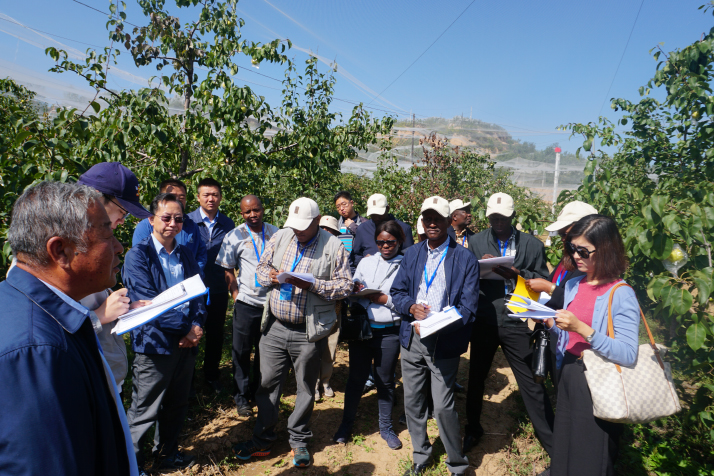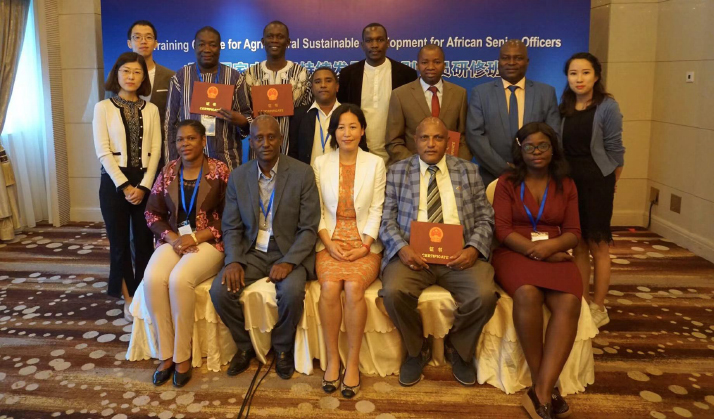|
||||||||||
| Home Nation World Business Opinion Lifestyle ChinAfrica Multimedia Columnists Documents Special Reports |
|
||||||||||
| Home Nation World Business Opinion Lifestyle ChinAfrica Multimedia Columnists Documents Special Reports |
| ChinAfrica |
| Toward Sustainable Agriculture |
| Senior African officials familiarize themselves with China's sustainable approach to agriculture |
| By Li Jing | VOL.11 November ·2019-10-29 |

African agricultural officials visit a pear growing base in Shanxi Province (COURTESY PHOTO)
Shouyang County in north China's Shanxi Province is famous for its fruits. Every autumn, thousands of people flock to local orchards to pick pears, which are famous for their sweetness and juiciness.
However, this year, Shouyang received a special group: 10 agricultural officials and experts from African countries. In addition to enjoying local pears, these visitors from afar had the chance to interact extensively with local technicians and learn more about local prolific planting techniques. They learned valuable lessons which will be useful to their respective countries.
"We also visited corn and rice plantations, where we interacted with agricultural technicians from Shanxi Province. It will be very beneficial for the agricultural development of our country," Ali Ibrahim Mohamed, an official from the Ministry of Agriculture, Water, Fisheries, Animal and Maritime Resources of Djibouti, told ChinAfrica.
Mohamed was one of the 10 participants of the Training Course for Agricultural Sustainable Development for African Senior Officers, which was launched in Beijing on September 19, 2019. Organized by China's Ministry of Agriculture and Rural Affairs, the course brought together officials and experts from Burkina Faso, Burundi, Eritrea, Djibouti, Zimbabwe and Mozambique.
In many African countries, agriculture remains one of the main economic pillars. The percentage of the population engaged in agriculture exceeds 80 percent in some countries, such as Burkina Faso and Burundi.
Agriculture is also one of the most important areas of Sino-African cooperation. According to Lin Huifang, Deputy Director of the Center for International Cooperation Services at the Ministry of Agriculture and Rural Affairs of China, 80 Chinese agricultural experts are currently based in Ethiopia, Burkina Faso, Burundi, Djibouti, Zimbabwe, Mozambique and São Tomé and Príncipe, to share their rich experiences and knowledge about the most advanced techniques with their local partners. In order to strengthen such cooperation, a number of African officials are invited every year by the Chinese Government to conduct field visits and technical exchanges in China.

Closing ceremony of the training course (COURTESY PHOTO)
Sharing tangible results
During the training, officials were able to exchange views on the latest achievements of agricultural cooperation in their respective countries.
"Agricultural cooperation with China has greatly improved our agricultural productivity. Our rice production has now reached 10 tons per hectare, compared to only 2 tons per hectare previously," said Maposse Daniel Rivas Muvimbene, an official from the Mozambican Ministry of Agriculture and Food Security.
"We hope that more Chinese agricultural experts can come to Zimbabwe!" said Tawonashe Dorcas, an official from Zimbabwean Ministry of Lands, Agriculture, Water, Climate and Rural Resettlement. According to her, agriculture is a major industry in Zimbabwe, accounting for 20 percent of its GDP. Currently, 10 Chinese agricultural experts are working in the country in many sectors, including livestock and plantation. Chinese experts have helped increase food production, improve technical training and establish demonstration centers to share their skills.
"[Djibouti] is currently in its fourth phase of agricultural cooperation with China, which has brought about many fruits, especially in the veterinary sector and fisheries," said Mohamed. He said Chinese agricultural experts have introduced animal disease prevention technologies and developed marine aquaculture, which has increased the income of local communities.
According to Liu Xiaoheng, Director of the China International Development Cooperation Agency, as of 2016, China had implemented nearly 500 agricultural cooperation projects in more than 50 African countries. During the period, China dispatched more than 10,000 agricultural experts to the continent and provided trainings to nearly 20,000 African agricultural officials and technicians. More than 20 agricultural demonstration centers have been built. Overall, their achievements have given a new impetus to food security and poverty reduction in Africa.
Practical approach
Besides technical knowledge, African officials were also able to familiarize themselves with agriculture as it is practiced in Chinese fields. To this end, the training program organized a visit to Shanxi Province by high-speed train.
As one of the important agricultural production regions in China, Shanxi Province applies various advanced farming techniques. During their stay there, officials visited plantation demonstration bases, farms and agricultural businesses where they met with local authorities and agricultural technicians.
"We visited fruit, corn, cotton and soya plantations. We learned how drones could be used in agriculture, including for mapping and seeding. These techniques, concepts and experiences shared by Chinese experts can make a significant contribution to my country's agricultural development," said Samaniro Jean Kennedy, an official of the Ministry for Environment, Agriculture and Livestock of Burundi.
Rodrigue Ouedraogo, an agricultural technician from Burkina Faso, said that he particularly valued exchanges with his Chinese counterparts during the seminar. "We had many opportunities to visit the fields and talk with local technicians. I hope I will have the opportunity to participate in a seminar specifically for technicians so that I can learn more about Chinese agricultural technologies."
Raymond Takudzwa Poteredzai-Mudzamiri, an agricultural official from Zimbabwe, found that Shanxi's dry climate is similar to that of his country, and that the agricultural techniques used there may be useful to Zimbabwean farmers.
To help these African officials better understand Chinese culture, the training program also included courses on traditional Chinese culture, Chinese language, calligraphy and tea ceremony.
Need for action
During the closing ceremony, organizers and participants stated that the seminar had fully met their expectations, providing them with much food for thought.
As the distribution of rainfall in Burkina Faso is uneven, Ouedraogo decided to focus his cooperation with Chinese agricultural experts on the construction of dams, in order to solve issues of water shortage and thus increase rice production.
For his part, Poteredzai-Mudzamiri said that Chinese agricultural policies, which he was able to better understand during the seminar, would serve as a reference for the development of Zimbabwe's own agricultural policies.
"I hope that participants will return home with ideas and experiences that they can immediately put into practice, in order to explore a path of sustainable development that suits the conditions of their respective countries," concluded Liu.
(Comments to lijing@chinafrica.cn)
|
||||||||||||
| About Us | Contact Us | Advertise with Us | Subscribe |
| Copyright Beijing Review All rights reserved 京ICP备08005356号-5 京公网安备110102005860号 |